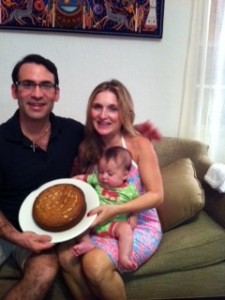 Yesterday we lost power, and I thought it might be a sign that the Lord wanted me to get a pedicure.
Yesterday we lost power, and I thought it might be a sign that the Lord wanted me to get a pedicure.
I know this is the kind of thing that only a crazier-than-crazy person thinks, much less says out loud. I know that the Lord probably does not spend much time thinking about my toes, and that he actually wasn’t trying to speak to me through electricity (yes, I hear how Son of Sam that sounds). It’s just that we happened to have a power outage, and I happen to need a pedicure (I look down at my ratty toes which have not been painted since November and I think, “This is not who you are!” and then I think, “Maybe it is who you are, now.”).
So yes, there is a chance that I am being slowly driven insane by shoddy toes and too much gallo pinto (is that possible? Because if it is I’m in trouble). But I also think it’s the time of year that had me–momentarily–looking for omens in the power company’s weaknesses. Because we’re just two weeks into 2013, Baby New Year is still an infant, and folklore indicates that there’s a deep psychological need in each of us to seek reassurances that a transition, like the passing of one year into the next, will go smoothly.
That’s why some cultures, like the Greeks and the Chinese, gamble at New Year’s, to get a preview of the luck that awaits them in the year to come. And it’s why many people eat “magic” foods at New Years, those which are thought to bring prosperity, such as black eyed peas or red beans in the American South (the beans are said to resemble coins), or grapes in Spain.

But the magic food I depend on the most is the Vassilopita, “St. Basil’s pie”, which Greeks eat on New Year’s Day, with a coin hidden inside. A piece is cut for every member of the family, and whoever finds the coin in his or her slice is said to have good luck all year. This is folklore, not science: David Sedaris has written that each time one of his relatives gets the coin a great calamity befalls them, so maybe in his family they have to read it in reverse.
Still, the Sedaris Principle indicates to me not that signs are faulty, but that you have to know how to read them properly. For example, when my friend’s uncle Joshi read my astrological chart and told me I’d marry in September 2010 (this happened in April 2008), she warned me, “Joshi-Uncle’s good, but he’s always a month off,” so I assumed I would get married on 10/10/10, and circled the date on my calendar, and then sure enough, I did. (Is this working to make me sound less crazy?)
I know what you’re thinking–that when prophesies come true it’s the power of the mind of the believer, not the fortuneteller at hand. If you get the coin in the pita and believe you’re going to have a great year, then you make it happen (or, if you’re a Sedaris, you recognise it as a harbinger of doom and prepare yourself for chaos). And perhaps you’re even thinking that somehow I made Joshi-Uncle’s prophesy come true, that I manifested the right man through the power of my belief in the divination, and then saw to it that we were married on the agreed-upon date. In which case, I thank you for your belief that I run the universe, but I have to assure you that if I truly had it in my power to draw Mr. Right into my life I would have done so maybe a year sooner than he appeared. And, also, I’d be about six inches taller than I am now.
The older I get, the more I think this question is the central conflict of life: Not does the Lord want Eleni to get a pedicure, nor is divination real, but how much of our lives are in our control, and how much of what happens to us is beyond our control? That’s the central theme of my novel, Other Waters, and it was also the central theme of my afternoon yesterday. In the end, when Amalía’s babysitter arrived, I headed out to a café in a neighborhood that still had power and spent the afternoon working as I had planned to do before acts of God/power outages. I also bought a vial of nail polish so that I can paint my own toes on my own schedule (yes, there’s something so “Mrs Dalloway said she would buy the flowers herself” about this whole tempest in a toenail, isn’t there?).
I’m starting to think that 2013 will be a year in which I learn unexpected info which will make me see life from a new perspective. Because I’ve been digging into vassilopita for over three decades now (usually rubbing my hands together as if at a roulette wheel and saying, “Come ON, little piece!”). But just last week I learned something new about the tradition. I got an email from the Athenian Society of New York inviting me to their annual cutting of the Vassilopita. (I’m still waiting on my invite from the Athenian Society of Granada, Nicaragua.) And they had a delightful little explanation of the custom. Apparently, back when St. Basil was bishop of Caesaria (remember that? Crazy times!), somehow he became responsible for all the townspeople’s jewelry; one theory is that there was a robbery, and the thieves were apprehended, but no one could agree on which items belonged to whom. So St. Basil had the valuables baked in a pita, sliced it up, handed it out and it turned out that everyone’s rightful jewelry was found in their piece of the pie.
So maybe that’s the answer; that a sign just points out what is already rightfully ours, whether it’s luck or life partners or toenail polish. Or maybe not.

In any case, I didn’t get the coin in this year’s vassilopita. But I’m not worried. I’m a girl who believes in second chances. February 10th is Chinese New Year, and I know where I can get a whole fish, guaranteeing me good luck from start to finish.